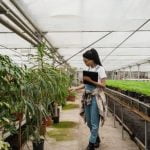Are you looking for creative and engaging ways to keep kids entertained and educated this summer? Look no further than gardening summer camp ideas. Gardening summer camps offer a unique and enriching experience for children, combining the joys of outdoor activities with the educational benefits of learning about plants, nature, and sustainability.
Gardening summer camps provide an ideal setting for kids to learn, play, and connect with nature. With a focus on hands-on activities and practical learning experiences, these camps offer children the opportunity to develop essential life skills while having fun in the sun. From planting seeds to harvesting vegetables, gardening summer camps are a great way to encourage children to develop a deeper appreciation for the environment while fostering their creativity and curiosity.
In this article, we will explore the numerous benefits of gardening for children’s development, as well as essential supplies and tools needed for gardening summer camps. Additionally, we will highlight various fun and educational gardening activities for kids, from creating sensory gardens to cooking with fresh garden produce.
We will also discuss the role of guest speakers and field trips in inspiring young gardeners at summer camps. Get ready to discover the exciting world of gardening summer camp ideas that will inspire a lifelong love for nature and sustainability in children.
Benefits of Gardening for Children’s Development
Gardening has numerous benefits for children’s development, making it a fantastic activity to incorporate into summer camps. Here are some of the key advantages that gardening offers for kids:
1. Environmental Awareness: Gardening summer camp ideas can help children develop a deeper appreciation for nature and the environment as they learn about plants, insects, and the ecosystem.
2. Physical Activity: Engaging in gardening activities involves physical movement such as digging, planting, watering, and weeding. This helps children stay active while having fun outdoors.
3. Mental Well-being: Gardening has been shown to have a calming effect on individuals, and this is especially beneficial for children who may experience stress or anxiety. Participating in gardening activities can provide an opportunity for kids to relax and connect with nature.
To fully reap the benefits of gardening summer camp ideas, it’s important to provide children with the right supplies and tools. Here are some essential items to consider including in your camp program:
By providing these supplies, children can actively participate in all aspects of gardening while staying safe and comfortable. These tools will allow them to engage in hands-on learning experiences that foster a love for nature and plant life.
Incorporating gardening into summer camps offers a wealth of benefits for children’s development, making it an ideal activity to include in any camp program. With the right supplies, tools, and guidance, kids can enjoy a variety of educational activities that encourage environmental awareness and physical activity while fostering mental well-being.
Essential Supplies and Tools for Gardening Summer Camps
When organizing a gardening summer camp for kids, it is important to ensure that the necessary supplies and tools are readily available. Providing the right equipment will not only make the activities more enjoyable, but it will also teach children about the importance of using the correct tools for gardening. Here are some essential supplies and tools that should be included in any gardening summer camp:
Basic Gardening Supplies
Before getting started with any gardening activity, it’s important to have the basic supplies on hand. This includes items such as gloves, watering cans, a hose or watering system, potting soil, and plant fertilizers. These supplies will help kids get their hands dirty (in a good way) and learn the fundamentals of caring for plants.
Gardening Tools
In addition to basic supplies, having the right tools is crucial for successfully conducting gardening activities. Some essential tools to consider include trowels, hand pruners, spades, rakes, and shovels. Teaching kids how to use these tools properly will not only assist them in their gardening endeavors but also instill a sense of responsibility and respect for the environment.
Child-Sized Equipment
To ensure that children can actively participate in all aspects of gardening, it’s important to provide them with child-sized equipment. This includes smaller shovels and rakes, lightweight watering cans, and kid-friendly gloves. Having appropriately sized tools will empower children to take ownership of their gardening tasks and make them feel more involved in the process.
By providing these essential supplies and tools at gardening summer camps, children will not only have a fun and educational experience but also gain valuable skills that they can carry with them throughout their lives. With proper guidance and access to necessary equipment, young participants can develop a lifelong love for gardening while learning about sustainable practices in an engaging environment.
Fun and Educational Gardening Activities for Kids
Gardening summer camps provide a unique opportunity for children to engage in fun and educational activities that promote a love for the environment and sustainable living. These camps offer a wide range of gardening activities for kids that help them connect with nature, learn new skills, and foster a sense of responsibility towards the environment.
Here are some fun and educational gardening activities for kids at summer camp:
1. Planting and Watering: Teach kids the basics of planting seeds or young plants in the soil, along with the importance of watering them regularly to help them grow. This hands-on activity allows children to learn about the plant life cycle and develop an appreciation for nature.
2. Garden Scavenger Hunt: Organize a scavenger hunt in the garden where kids can search for different types of plants, flowers, insects, and other natural elements. This activity encourages children to observe their surroundings closely and learn about biodiversity.
3. Garden Art Projects: Engage children in creative art projects using natural materials from the garden such as leaves, flowers, or twigs. This can include making leaf rubbings, flower pressing, creating nature collages, or painting rocks. These activities not only stimulate creativity but also reinforce the connection between art and nature.
4. Composting Workshop: Educate kids about composting by involving them in collecting kitchen scraps and organic waste to create compost for the garden. They can learn about recycling organic matter to enrich the soil and reduce waste while contributing to a sustainable gardening practice.
5. Garden Pollinator Observation: Teach children about the role of pollinators in the garden ecosystem by introducing them to bees, butterflies, and other beneficial insects. Encourage them to observe these pollinators in action while discussing their importance in plant reproduction.
Incorporating these engaging activities into gardening summer camps helps children develop valuable skills while fostering an appreciation for nature and sustainable living practices.
Planting and Growing Vegetables and Herbs at Gardening Summer Camps
One of the most exciting and rewarding activities at gardening summer camps is planting and growing vegetables and herbs. Not only do kids get to learn about the different types of plants, but they also get to witness the entire growth process firsthand. From preparing the soil to sowing the seeds and nurturing the plants as they grow, children can experience the joy of watching their efforts come to fruition.
At gardening summer camps, it’s essential to choose a variety of vegetables and herbs that are easy to grow and maintain. This allows kids to see tangible results within the duration of the camp.
Some popular choices for vegetables include cherry tomatoes, carrots, and snap peas, while herbs like basil, mint, and parsley are great options for beginners. Additionally, teaching children about organic gardening practices such as using natural fertilizers and pesticides will not only instill good habits but also promote environmental consciousness.
Moreover, incorporating lessons on sustainability and responsible consumption can help children understand the value of locally grown produce. Through hands-on experience in growing their own food, kids can develop a deeper appreciation for nature’s resources while learning about healthy eating habits. Engaging in gardening activities fosters a sense of responsibility and empowerment as children take on an active role in contributing to their own well-being.
| Activity | Recommended Plants |
|---|---|
| Vegetable Planting | Cherry tomatoes, carrots, snap peas |
| Herb Planting | Basil, mint, parsley |
Creating a Sensory Garden for Children to Explore
A sensory garden is a wonderful addition to any gardening summer camp. Not only does it provide an opportunity for children to engage with nature, but it also allows them to explore their senses in a unique and interactive way. A sensory garden can include a variety of plants, textures, scents, and even edible elements that stimulate the senses of sight, touch, smell, and taste.
Incorporating elements such as fragrant flowers, fuzzy leaves, smooth stones, and herbs with distinct scents can help children develop their sensory awareness while also fostering an appreciation for the natural world. Additionally, including plants that attract butterflies and birds can create opportunities for children to observe wildlife up close and learn about the interconnectedness of all living things.
One fun gardening summer camp idea for creating a sensory garden is to have the campers participate in designing and planting the garden themselves. This hands-on activity not only teaches children about plant care and cultivation but also instills a sense of ownership and pride in their creation. By involving them in the process from start to finish, they can better understand the impact of their efforts and witness the tangible results of their hard work.
Another engaging activity for children at gardening summer camps is to hold sensory scavenger hunts in the garden. Campers can be given lists of textures, colors, scents, or tastes to find within the garden, encouraging them to fully immerse themselves in experiencing nature with all of their senses. This activity not only provides an opportunity for physical activity but also encourages curiosity and observation skills as they search for various sensory items throughout the garden.
Overall, creating a sensory garden at a gardening summer camp offers countless benefits for children’s development while providing a dynamic and engaging way for them to connect with nature. By incorporating this element into the camp program, organizers can ensure that young participants have an enriching experience that fosters a deeper understanding and appreciation for the natural world around them.
Nature Crafts and DIY Projects Using Garden Materials
Garden-Inspired Art
One of the most exciting aspects of gardening summer camp is the opportunity to use natural materials to create art and crafts. Children can collect leaves, flowers, twigs, and other garden treasures to create beautiful nature-inspired artwork. You can organize activities such as leaf rubbing, flower pressing, and making nature collages. These projects not only allow kids to express themselves creatively but also help them appreciate the beauty of the natural world around them.
DIY Birdhouses and Feeders
Another fun activity for gardening summer camps is building birdhouses and bird feeders using garden materials. Kids can use recycled materials like old milk cartons or wooden popsicle sticks along with natural items like twigs, pine cones, and seeds to craft their own bird-friendly habitats. Not only will this project teach children about the importance of supporting local wildlife, but it will also give them a sense of accomplishment as they witness birds making use of their creations.
Nature-Themed Jewelry Making
Using small stones, beads, and colorful feathers found in the garden, campers can create their own nature-themed jewelry pieces. This hands-on activity encourages fine motor skills development while allowing children to showcase their unique style. Whether they choose to make a necklace adorned with garden treasures or a bracelet decorated with vibrant flower petals, kids will take pride in wearing and sharing their nature-inspired creations.
Including these nature crafts and DIY projects using garden materials in your gardening summer camp can enhance the overall experience for young participants by allowing them to connect with nature in a creative way. Encouraging creativity through art and handcrafts fosters an appreciation for the environment while providing endless opportunities for fun and self-expression.
Culinary Adventures
One of the most enjoyable and rewarding activities at gardening summer camps is cooking with fresh garden produce. Not only does it teach children valuable culinary skills, but it also encourages them to appreciate the fruits of their labor.
By incorporating cooking into the summer camp curriculum, kids can learn how to use a variety of vegetables and herbs that they have planted and grown themselves. This hands-on experience not only promotes healthy eating habits but also empowers children to be more self-sufficient.
At gardening summer camps, children can participate in a range of cooking activities, from preparing simple salads with freshly harvested vegetables to making homemade pesto using basil from the camp’s herb garden. They can also learn how to make fruit smoothies using berries grown on site or bake delicious zucchini bread using zucchinis they’ve cultivated themselves.
By involving children in the process of preparing and cooking with fresh garden produce, they are more likely to try new foods and develop a lifelong love for healthy eating.
In addition to learning how to cook with fresh garden produce, culinary adventures at gardening summer camps provide opportunities for children to understand where their food comes from and how it’s grown. This hands-on approach to cooking fosters a deeper appreciation for nature and the environment.
It also gives kids a sense of pride and accomplishment as they create delicious meals using ingredients that they have nurtured from seedlings. Through these culinary adventures, children not only gain important life skills but also develop a sense of responsibility and respect for nature.
| Activity | Benefit |
|---|---|
| Cooking with fresh garden produce | Teaches children valuable culinary skills; encourages healthy eating habits; promotes self-sufficiency |
| Preparing salads with freshly harvested vegetables | Encourages trying new foods; fosters appreciation for nature and the environment |
| Making homemade pesto using basil from the herb garden | Enhances understanding of where food comes from; develops a sense of responsibility toward nature |
Guest Speakers and Field Trips to Inspire Young Gardeners
Incorporating guest speakers and field trips into gardening summer camps can provide children with a unique and enriching experience. Inviting local horticulturists, botanists, or master gardeners to speak to campers about the importance of gardening can inspire young minds and foster a passion for the natural world. These experts can share their knowledge, stories, and experiences with the campers, providing valuable insights into the art and science of gardening.
Additionally, organizing field trips to botanical gardens, community farms, or nurseries can further enhance the educational aspect of gardening summer camps. Exploring different types of gardens and learning about various plant species in a hands-on environment can deeply impact children’s understanding of nature and cultivation. Moreover, these field trips can offer a refreshing change of scenery for campers while allowing them to witness firsthand the beauty and diversity of plant life.
Moreover, bringing in guest speakers related to environmental conservation or sustainable living can also broaden campers’ perspectives on gardening as part of a larger ecosystem. By exposing children to different aspects of environmental stewardship through engaging presentations and discussions, they may develop a deeper appreciation for the interconnectedness between plants, animals, and humans.
Overall, incorporating guest speakers and field trips at gardening summer camps can ignite curiosity and passion for gardening in young participants while fostering an appreciation for nature’s wonders.
Conclusion
In conclusion, gardening summer camps offer children a unique and enriching experience that can foster a lifelong love for gardening and the natural world. By providing hands-on activities, educational opportunities, and exposure to the wonders of nature, these camps can help children develop a deep appreciation for the environment and all its inhabitants.
The benefits of participating in gardening summer camps go beyond just learning how to plant and care for a garden; they also include important life skills such as responsibility, patience, and teamwork.
Furthermore, gardening summer camp ideas provide children with the chance to connect with the earth and understand where their food comes from. Engaging in activities such as planting and growing vegetables and herbs not only teaches them valuable skills but also encourages healthy eating habits. Additionally, exploring sensory gardens and creating nature crafts using garden materials allows children to engage all their senses while fostering creativity and imagination.
As we strive to instill in our youth a respect for the planet and an understanding of sustainable living practices, gardening summer camps can play a crucial role in shaping future generations. By incorporating guest speakers and field trips into these programs, we can inspire young gardeners to become proactive stewards of the environment.
With the right guidance, support, and exposure to nature’s beauty, we can empower children to carry their passion for gardening into adulthood. Ultimately, teaching children about the joys of horticulture at an early age can have long-lasting effects on their overall well-being as well as their connection to the world around them.
Frequently Asked Questions
What Is the Most Popular Summer Camp Activity?
The most popular summer camp activity varies depending on the location and the interests of the campers. However, common favorites include swimming, hiking, arts and crafts, team sports, and camping out in nature.
Is Gardening a Creative Activity?
Gardening can definitely be considered a creative activity. From planning and designing your garden layout to choosing which plants to cultivate and how to arrange them, gardening allows for self-expression and aesthetic appreciation.
How Do I Prepare My Garden for Summer?
To prepare your garden for summer, start by cleaning up any debris from the spring season and clearing out weeds. Then, assess your soil’s condition and add compost or fertilizer as needed. Finally, make sure to water your plants regularly and protect them from extreme heat if necessary.

Welcome to my gardening blog! I am passionate about plants and enjoy sharing my knowledge and experiences with others. In this blog, I will write about everything related to gardening, from tips on how to get started to updates on my own garden projects.





